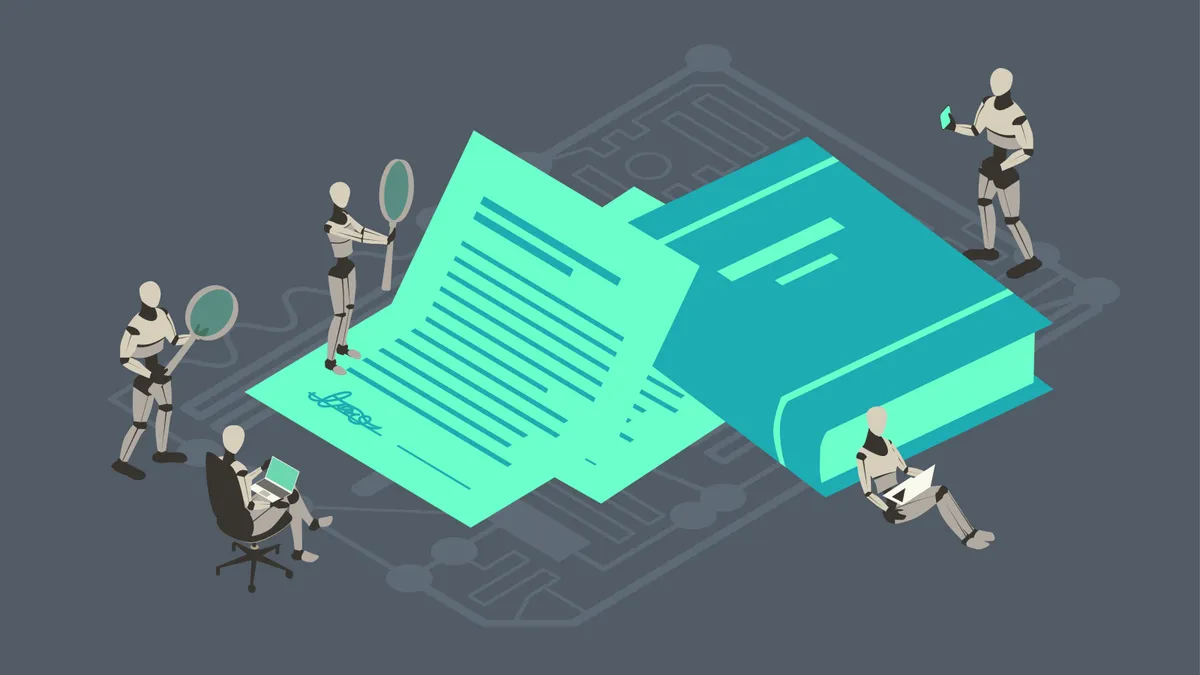Legal operations professionals may think generative AI adoption will ramp up significantly among law firms and law departments, but industry experts speaking at a virtual roundtable hosted by the Blickstein Group last week say many implementation issues need to be resolved.
Generative AI brings “super high expectations and that legal operations folks are very optimistic, but that gap between the expectations on strategy versus reality and execution is massive,” said Robert Taylor, managing director of legal business services at Deloitte, who emphasized that the change-management process to prepare staff for wider adoption could be significant.
In a Blickstein Group survey of 82 law department operations professionals across the U.S. conducted in late 2023, 85% said they believe most law departments and most law firms will be using generative AI substantially in the next three years. Two thirds said it would help them bring more work in-house, while 70% said it would lower their legal costs.
Generative AI and the cost conundrum
Generative AI is already affecting how legal departments do business, the survey found. Among respondents, 24% said they have generative AI-driven tools and are planning to update them, while 36% said they do not yet have tools but plan to add them.
Shannon Kirk, global legal industry solutions director at contract management software firm Icertis, said generative AI can cut down on mundane tasks, allowing lawyers and law departments to focus on higher-value work. It’s still an open question, however, on whether those savings will be passed on to clients.
“Law firms, as we all know, are very good at finding billable hours and finding dollar value,” she said. “I think we’re going to see a lot of creativity between law departments and law firms about how they’re approaching their agreements and billable hours.”
The introduction of generative AI will likely result in improved productivity, said Taylor, but it’s unclear whether it will yield massive savings for clients.
“There may be firms touting that they’re passing on some of these cost savings to their clients … but I just don’t see that,” in the next two to three years, he said. “I see them as maximizing these tools in order to maximize their own profit.” Generative AI may, however, help offer more certainty around flat fees or alternative fee models, especially in instances where a law firm can reduce the cost of delivery.
Generative AI may also trigger greater use of alternative fee arrangements that are more focused on value than cost, said Taylor.
“These tools are being embedded,” in research and drafting technology capabilities, he said. “If it creates more certainty on the delivery side, and the clients feel like they’re getting value from that, I think we’re going to see an increase” in alternative fee arrangements.
Uptake for generative AI
Despite an openness to introducing the technology, some roundtable participants expressed skepticism about openness to the rollout of generative AI among law firms and law departments, particularly the overwhelming (85%) proportion of respondents who said generative AI will law departments and law firms will be substantially using generative AI over the next two to three years.
“It’s fair to say that this particular response is probably a bit of respondent bias,” said Taylor, who noted that lawyers might be less optimistic about the rollout of generative AI.
While the response might have represented respondents’ feelings about industry adoption, it may not have referred to conditions in their own companies, said Jason Smith, senior principal of strategy and transformation at revenue management software company Conga. The term “substantially” is also open to interpretation, suggested Kirk.
Brad Blickstein, principal at Blickstein Group, noted that legal operations professionals have historically been optimistic about technology adoption and likely believe that the industry is on the cusp of a major change.
The industry, of course, has successfully adapted to wide-ranging technology changes in the past, including the rollout of email and mobile phone adoption, said Smith.
Just 10% of survey respondents said they outright forbid their law firms to use generative AI. Experienced lawyers may be more reticent to use generative AI given that they are typically more risk-averse, suggested Smith.
Implementation challenges
It’s unclear the extent to which lawyers will use generative AI beyond mundane tasks. They may need to exercise greater oversight on generative AI-drafted materials.
“I'm very confident and comfortable with generative AI when I'm creating presentations or drafting creative documents,” said Smith. “When I get into a complex agreement, [I’m] maybe not so comfortable with what it's spitting out and how much oversight I need.”
Concerns about data security and disclosure of generative AI use also need to be worked out, panelists said. However, as generative AI becomes increasingly embedded in off-the-shelf tools, disclosure protocols will become clear, panelists said.
“Eventually, guidance on how you're using it will become something that law firms will instinctively get ahead of,” with ways to describe how generative AI is being deployed instead of a blanket disclosure on whether or not the technology is being used, said Smith.


















